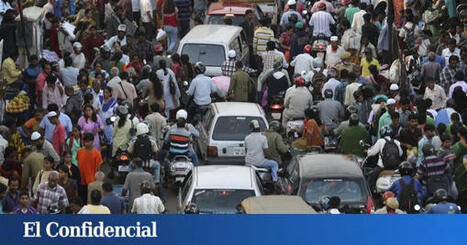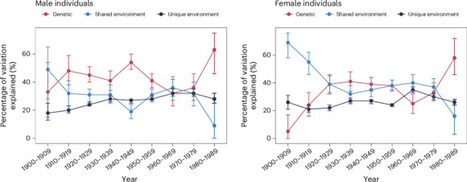 Your new post is loading...
 Your new post is loading...
Prenatal exposure to ambient fine particulate matter and climatic factors, such as temperature and rainfall, are associated with adverse birth outcomes in India, according to a study published... read more.
Prenatal exposure to ambient fine particulate matter and climatic factors, such as temperature and rainfall, are associated with adverse birth outcomes in India, according to a study published July 2nd, 2025, in the open-access journal PLOS Global Public Health by Mary Abed Al Ahad from the University of St Andrews, U.K.
Fewer countries are doing censuses owing to Covid-19, budget cuts, and lower trust in government
Reform UK has moved into pro-natal policies territory – but experts warn there’s no magic silver bullet
Un nuovo studio pubblicato su Biomolecules[1] rivela che il lavoro da casa, sebbene sempre più diffuso, non ha modificato in modo sostanziale la distribuzione geografica della forza lavoro qualificata nel Regno Unito.La flessibilità non cambia la geografia
Dopo la pandemia, molti speravano che
Prevalence of hybrid over fully remote roles dashes hopes of greater geographical spread of talent
In this episode of Causes or Cures, Dr. Eeks talks with Dr. Mary Abed Al Ahad about how long-term exposure to air pollution is quietly driving people to the hospital. Drawing from her recent study, Dr. Abed Al Ahad breaks down which specific pollutants were linked to higher hospitalization rate
While many women fully embrace motherhood and the joy it brings to their lives - others find parenting a relentless quest. With fertility rates continuing to decline, a mother has candidly opened up on why she regrets having a child
Open share How robots will change our jobs Difficult to imagine today, but idea that “robots will take our jobs” used to be met with optimism. The idea was that automation would enable us to work less and enjoy leisure. In the 1980s pessimism began to rise as automation became a reality.
Entenda como a decisão dos millennials de não ter filhos pode reduzir o PIB dos EUA em até 4%.
Decidir não ter filhos é uma escolha pessoal que vem ganhando destaque entre os millennials. Essa mudança de comportamento pode impactar a economia dos
Naciones Unidas celebró en 2022 la cifra de ls 8.000 millones de habitantes en todo el planeta. Sin embargo, un nuevo estudio sugiere que podríamos ser muchos más debido a errores en los datos rurales
Fique por dentro das últimas notícias sobre a Bolsa, Mercado Financeiro e dinheiro. Confira também dicas de investimentos e educação financeira no E-Investidor.
|
Odluka o tome kada postati majka jedna je od najvažnijih odluka u životu žene. Iako trudnoća nije samo biološko, već i emocionalno i društveno pitanje, postoje određeni periodi koje stručnjaci ističu kao najpovoljnije za začeće, i fizički i psihički. razdoblju plodnost je na vrhuncu, jajne stanice su kvalitetnije,
Official data shows rise in single patients and female same-sex couples opting for assisted fertility treatments
UN study suggests economic strains, including job insecurity, among the biggest barriers to parenthood
Women are still far more likely than fathers to stay at home with ill children and do the school run, a study has found
According to new research, 52% of all UK workers never work from home, but that figure drops to 29% for highly skilled workers. Find out more.
Covid-19 pandemic forced a change in how the country works with more companies adopting hybrid working
It could have been a first step in levelling the UK’s gender pension gap.
In civilizations, individuals are born into or sorted into different levels of socio-economic status (SES). SES clusters in families and geographically, and is robustly associated with genetic effects. Here we first review the history of scientific research on the relationship between SES and heredity. We then discuss recent findings in genomics research in light of the hypothesis that SES is a dynamic social construct that involves genetically influenced traits that help in achieving or retaining a socio-economic position, and can affect the distribution of genes associated with such traits. Social stratification results in people with differing traits being sorted into strata with different environmental exposures, which can result in evolutionary selection pressures through differences in mortality, reproduction and non-random mating. Genomics research is revealing previously concealed genetic consequences of the way society is organized, yielding insights that should be approached with caution in pursuit of a fair and functional society. Abdellaoui et al. synthesize genomic evidence on the link between socio-economic status and heredity. They show how social stratification may create selection pressures, meaning that individuals are clustered in distinct environments. This may have consequences for genetic architectures and social inequality.
High childcare costs and potential parents’ lifestyle choices are among the factors leading to a demographic disaster decades in the making
A queda na taxa de natalidade nos EUA e seu impacto econômico e social. Especialistas discutem sobre os desafios enfrentados pela sociedade com a decisão de não ter filhos.
Les derniers rapports démographiques estiment que nous sommes environ 8,2 milliards d'habitants dans le monde et que nous atteindrons notre apogée en 2080. Une étude a analysé ces données et estime que nous avons laissé derrière nous entre 1 et 3 milliards de personnes.
In November 2022, the UN celebrated the fact that there were now 8 billion humans on Earth. These are estimates, of course, but beyond the numbers, what is truly interesting is that we are now 8 billion humans on Earth.
|




 Your new post is loading...
Your new post is loading...



























